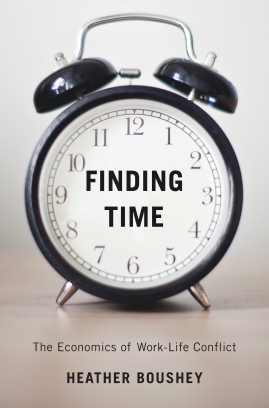It’s not often someone writes a book for you, but I feel that’s the case with Heather Boushey’s Finding Time: The Economics of Work-Life Conflict.
I’ve had the good fortune to be married to Heather for nine years today. We met while working at the Center for Economic and Policy Research in 2003, and I’ve seen her grow from a research economist into a top policy advisor and director of Equitable Growth.
Heather started the book in Cambridge, UK, when she joined me in the first year of a PhD program. I’ve been lucky enough to hear about the book’s development on a near daily basis for the last four years, and to have been able to read several drafts.
The book is the written version of debates we’ve had over the dinner table. I’ve long worked on obscure legal issues in the global economy, while Heather’s research interests in recent years have focused on work-life policies like childcare. We’ve used each other as sounding boards for our work. The idea being, if we can’t make our ideas interesting to one another (with such divergent topical interests), we’ll find it difficult to speak to a broader audience.
And I’ve been a very difficult audience. My interests tend towards the abstract. And we don’t have kids, so I don’t have a lot of immediate self-interest in social policies like childcare.
“Finding Time” aims to convince me and people like me that work-life conflict is both interesting and politically important. It succeeds on both levels, for several reasons.
First, the book isn’t just for traditional families. it is foremost a book about economic  ideas. While work-life advocates and parents will find their struggles validated in its pages, “Finding Time” reaches well past them to engage economic generalists. For the childless among us, work-life issues have historically been something that affected other people – that coworker that had to leave early to pick up a kid, or that sibling that took maternity leave. Heather makes a compelling case that the management of time is a pressing problem for the health and productivity of the economy as a whole.
ideas. While work-life advocates and parents will find their struggles validated in its pages, “Finding Time” reaches well past them to engage economic generalists. For the childless among us, work-life issues have historically been something that affected other people – that coworker that had to leave early to pick up a kid, or that sibling that took maternity leave. Heather makes a compelling case that the management of time is a pressing problem for the health and productivity of the economy as a whole.
Second, it isn’t just “for the ladies.” As Heather shows, men benefit from sane scheduling practices, child-care, and other policies just as much as women.
Third, it provides an intellectual basis for a new kind of social mobilization. Early feminism called out unequal citizenship, second wave feminism called out patriarchy and men, third wave feminism called out other feminists, and fourth wave feminism called out the Internet. These efforts emphasized difference and demanded solidarity. But as the success of populist efforts this year shows,* there is also a role for efforts that emphasize shared concerns. Heather’s work provides a framework for accomplishing many traditional feminist goals through making demands of the state and business as much as of family members, fellow feminists, and Internet trolls. Indeed, the book speaks directly to the broad debate on inequality, by showing how the power of the top 1% affects our daily life both while at work and back at home.
Finally, there’s lots of pictures and humor in the book. Good for short attention spans!
Go buy the book! I need to take Heather somewhere nice for dinner!